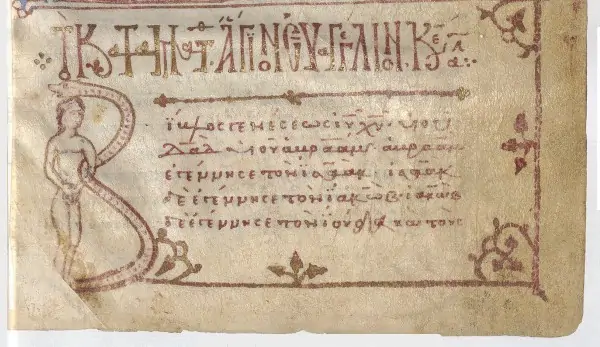The mystery and possible solutions to the first two words of the Book of Matthew.

The start of the Book of Matthew seems reasonable, but a closer look reveals some tension. In the English translation, it begins with, “A record of the genealogy. . .” which appears straightforward. The Greek is ambiguous. It has Βίβλος γενέσεως, which is very close to the words the Book of Genesis.
Garrick V. Allen, A New Testament Scholar at the University of Glasgow, recently brought up this discussion via Twitter (@Garrick_V_Allen, November 21, 2021). Did Matthew intend to start his book as the new age of Genesis with Christ being the new incarnation for humanity? Or is it just accidental?
Dr. Allen forwarded a picture from a thirteenth-century manuscript, grec 941, held at la Bibliothèque nationale de France (BNF) demonstrating the age-old discussion of how to understand this introduction.2
As shown above, the manuscript has a drawing in the introduction of Eve and the serpent. It demonstrates the copyists’ and illustrators’ interpretation. Matthew referred to the Book of Genesis.
Brian Davidson, a passionate Greek-Latin-Hebrew advocate and teacher, pondered on this question in his article, Genesis in Matthew 1:1. He is 50/50 on the issue. Tim Lewis, a Greek and Syriac enthusiast, reflects on this passage in his article . He translates the text as The Book of the Genesis of Jesus Anointed/Messiah, Son of David, Son of Abraham. However, he stopped at this point in his translation and redirected its meaning. He thinks it only means story or life in this context. The connection with the Book of Genesis is loose.
One argument against the Genesis connection is the Greek titling of the Book of Genesis, for example the 4th century Codex Vaticanus has it written as Γένεσις not γενέσεως as Matthew wrote it. 3 The International Bible Society may counter this in their article, Intro to Genesis where they sort-of imply that γενέσεως is a variant of γένεσις or vice-versa.
The English title, Genesis, is Greek in origin and comes from the word geneseos, which appears in the pre-Christian Greek translation (Septuagint). . .
Where they acquired this information, is not known.
What did Matthew intend? It is not conclusive either way. It shows that even the most mundane English text can have some weird twists and turns in the original language.